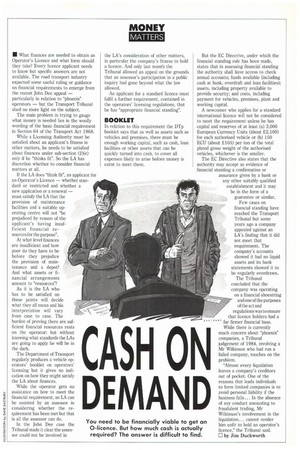ASH ON
Page 29

If you've noticed an error in this article please click here to report it so we can fix it.
DEMAND
You need to be financially viable to get an 0-licence. But how much cash is actually required? The answer is difficult to find. • What finances are needed to obtain an Operator's Licence and what form should they take? Every licence applicant needs to know but specific answers are not available. The road transport industry expected some useful ruling or guidance on financial requirements to emerge from the recent John Dee appeal —
particularly in relation to "phoenix" operators — but the Transport Tribunal shed no more light on the subject.
The main problem in trying to gauge what money is needed lies in the woolly wording of the basic financial requirement in Section 64 of the Transport Act 1968.
While a Licensing Authority must be satisfied about an applicant's fitness in other matters, he needs to be satisfied about finances under sub-section (2)(e) only if he "thinks fit". So the LA has discretion whether to consider financial matters at all.
If the LA does "think fit", an applicant for an Operator's Licence — whether standard or restricted and whether a new application or a renewal — must satisfy the LA that the provision of maintenance facilities and a suitable operating centre will not "be prejudiced by reason of the applicant's having insufficient financial resources for the purpose".
At what level finances are insufficient and how poor do they have to be before they prejudice the provision of maintenance and a depot? And what assets or financial arrangements amount to "resources"?
As it is the LA who has to be satisfied on these points will decide what they all mean and his interpretation will vary from case to case. The burden of proving there are sufficient financial resources rests on the operator: but without knowing what standards the LAs are going to apply he will be in the dark.
The Department of Transport regularly produces a vehicle operators' booklet on operators' licensing but it gives no indication on how they might satisfy the LA about finances.
While the operator gets no assistance on how to meet the financial requirement, an LA can be assisted by an assessor in considering whether the requirement has been met but that is all the assessor can do.
In the John Dee case the Tribunal made it clear the assessor could not be involved in the LA's consideration of other matters, in particular the company's fitness to hold a licence. And only last month the Tribunal allowed an appeal on the grounds that an assessor's participation in a public inquiry had gone beyond what the law allowed.
An applicant for a standard licence must fulfil a further requirement, contained in the operators' licensing regulations, that he has "appropriate financial standing".
BOOKLET
In relation to this requirement the DTp booklet says that as well as assets such as vehicles and premises, there must be enough working capital, such as cash, loan facilities or other assets that can be quickly turned into cash, to cover all expenses likely to arise before money is earnt to meet them. But the EC Directive, under which the financial standing rule has been made, states that in assessing financial standing the authority shall have access to check annual accounts; funds available (including cash at bank, overdraft and loan facilities); assets, including property available to provide security; and costs, including payment for vehicles, premises, plant and working capital.
A newcomer who applies for a standard international licence will not be considered to meet the requirement unless he has capital and reserves of at least (a) 3,000 European Currency Units (about £2,100) for each authorised vehicle or (b) 150 ECU (about £105) per ton of the total plated gross weight of the authorised vehicles, whichever is the smaller.
The EC Directive also states that the authority may accept as evidence of financial standing a confirmation or assurance given by a bank or any other suitably qualified establishment and it may be in the form of a guarantee or similar.
Few cases on financial standing have reached the Transport Tribunal but some years ago a company appealed against an LA's finding that it did not meet that requirement. The company's accounts showed it had no liquid assets and its bank statements showed it to be regularly overdrawn. The Tribunal concluded that the company was operating on a financial shoestring and one of the purposes of the act and regulations was to ensure that licence holders had a "" far firmer financial base. While there is currently much concern about "phoenix" companies, a Tribunal judgement of 1984, involving a Mr Wilkinson who had run a failed company, touches on the problem.
"Almost every liquidation leaves a company's creditors out of pocket. One of the reasons that leads individuals to form limited companies is to avoid personal liability if the business fails... In the absence of any conduct amounting to fraudulent trading, Mr Wilkinson's involvement in the liquidation.., cannot render him unfit to hold an operator's licence," the Tribunal said. CI by Jim Duckworth












































































